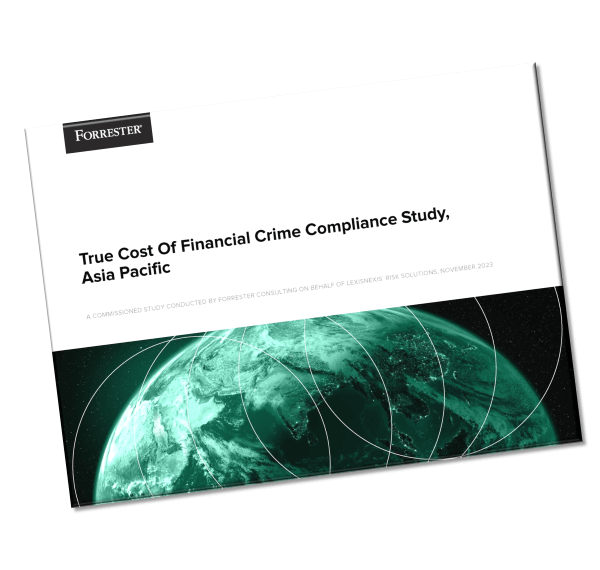
True Cost of Financial Crime Compliance Study, 2023 Asia Pacific
Find out the cost of financial crime compliance in APAC

The new "True Cost of Financial Crime Compliance Study, 2023 Asia Pacific" surveyed respondents in five markets – Australia, China, India, Japan, and Singapore – and projects that the total cost of financial crime compliance will approach the $45 billion mark in 2023.
The analysis highlights that China and Japan carry the highest financial crime compliance costs, reaching approximately $20.4 billion and $17.8 billion, respectively. A deeper dive into the factors influencing these costs reveals a significant impact from labor (41%) and technology (32%) in APAC. These factors are driven by escalating financial crime regulations, regulatory expectations, the aftermath of banking and financial crises, and the integration into digital channels, including corresponding e-KYC controls.
Key Highlights
- Unveiling Compliance Costs: Explore a detailed breakdown of compliance costs, with China and Japan taking the lead at $20.4 billion and $17.8 billion. Labor (41%) and technology (32%) play pivotal roles, shaped by rising regulations, banking crises, and digital integration.
- Navigating Challenges: Top challenges include regulatory reporting, positive identification of sanctioned entities or PEPs, and KYC for account onboarding. Gain insights into institutions' struggles, crucial for strategic planning.
- Strategic Opportunities: Financial Institutions plan to enhance KYC procedures, internal compliance solutions, data quality, transaction monitoring, and AML over the next few years. Anticipated benefits include streamlined products, increased efficiencies, and improved collaboration. Learn from their planned activities for strategic planning.
- Expert Analysis by Forrester: Benefit from Forrester's renowned research expertise, ensuring a robust and insightful exploration of the compliance scenario in APAC.
Why This Study Matters:
In a world where compliance is a critical aspect of financial institution operations, this study goes beyond the surface, unraveling the complexities that institutions are encountered while implementing a compliance program in APAC. Whether you're a financial professional, industry expert, or simply curious about this evolving landscape, this study is your gateway to a deeper understanding.
Stay tuned as LexisNexis® Risk Solutions unveil a wealth of knowledge, providing a comprehensive perspective on the true cost of compliance in APAC. This study isn't just a report; it's a strategic tool to empower institutions in navigating the compliance challenges effectively.
Complete the form to download True Cost of Financial Crime Compliance APAC Study
Products You May Be Interested In
-
Bridger Insight® XG
Streamline regulatory compliance, protect your business and increase revenue
Learn More -
Firco Continuity
Screen transactions at speed, control costs and meet regulator requirements
Learn More -
Firco Trade Compliance
Gain speed and precision in trade finance screening
Learn More -
LexisNexis® RiskNarrative™
Redefine how you onboard customers and monitor financial crime risk through a single API and platform environment
Learn More -
WorldCompliance™ Data
Robust databases of high-risk individuals and entities
Learn More -
WorldCompliance™ Online Search Tool
One-stop Sanctions, PEPs and Adverse Media solution
Learn More
